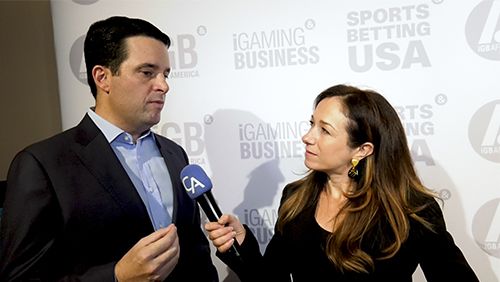The Super Bowl this weekend is set to be the single biggest sporting event of the year. With several new states now offering legal sports betting, it could set records for the amount of handle taken by operators. The NFL has been planning for this day for some time, and the NFL’s Chief Strategy & Growth Officer, Christopher Halpin, joined our Becky Liggero Fontana to discuss the league’s approach to growing its brand through gambling.
A big focus of the NFL has been to get sports betting right, and that takes a broad approach. “Given our national scale and how NFL fans are everywhere in the U.S., and we’re the biggest sport, we’ve got so many different points of focus when it comes to sports betting legalization,” Halpin said. “Talking to regulators and the industry operators, we want to make sure there’s solid legislative structure for states that roll out, that protect consumers that provide transparent markets.”
But with many still opposing legalized sports betting in the U.S., Halpin has had to contend with those who rather not embrace the gambling that’s already happening. “By our research, just under 20% of our fans are active sports bettors today, and about 20% are active rejecters of sports betting,” he noted. “And each group over rates how big their own group is, which is the nature of a lot of behaviors. The approach is, there’s no right answers. It’s a behavior, it’s something that each state will have its own approach on. What we say is that it’s going on, everyone knows that there’s been a large illegal market for years.”
What does Halpin say to these detractors? “What’s I think more insightful when we talk to regulators and to other stakeholders is that it’s a heavily online illegal market with offshore books being done digitally predominantly mobile phones,” he said. “It’s not really people going around to the corner bookie anymore. So that’s happening in your state today. If a state doesn’t want to legalize sports betting or someone’s not focused on it, that’s fine and there’s enough going on. It may evolve over time that you know, all states legalize. Unlikely, each state chooses its own approach. But we want to work with the ones who are thinking about sports betting legalization to put in the right structure, protect consumers and have the best long term approach.”
Liggero Fontana asked Halpin what types of services the NFL hopes to see from sports betting operations. “It’s a great question, and it goes to serving different segments of fans,” he replied. “So there’s the pure product of a sports betting app that would have video integrated, we see this a lot in Europe. That’s going to be a digital product competition of who has the most engaging, intuitive, highest conversion app. But we’re also focused on more casual, lighter experiences, and this has been a big part of the NFL informally for years. Whether its things like Super Bowl Squares, or survivor pools. In states that legalize, those are increasingly going to be offerings to the more casual fan and those products are going to be similar to casual social gaming: how easy to understand the product is, how positive the experience is and how fun it is.”
Of course, with a more experienced legalized market, the NFL had lots to learn from Europe, and it was taking notes. “We spent a lot of time as PASPA is increasingly likely to be struck down, analyzing the international learnings and examples,” Halpin said. “And what’s been great is the sporting bodies, teams, regulators, and other markets, especially the U.K., Australia, otherwise have been very open about sharing what worked, what didn’t, what their biggest regrets are. Also analyzing consumer behavior, it was clear online is the answer. And when you look across Europe, as legalization online happened, lower tax rates, better user experiences, more competition led to more illegal market conversion, which is one of the key lessons.”
Even with all of their homework done, Halpin notes that the U.S. will be a different beast. “There are things that are going to be different about U.S. sports betting, especially as it’s done state-by-state,” he said. “There’s a broader diversity of sports that people bet on in the U.S., there’s more all year round, rather than in many countries it’s predominantly soccer. There’s also a variety of different channels that you can reach and engage fans. So we’ve learned a lot of examples, we’ve applied that to our regulatory structures, we’ve also taken approach of be patient and see how the U.S. evolves.”
